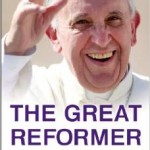Pretty recently I wondered whether ideas to reform our annulment process would be seen by people as “amnesty” or necessary mercy:
An attempt to streamline the annulment process is not an idea that will please everyone. Those who. . .have jumped through the hoops and endured the long and difficult bureaucratic processes may justifiably wonder about fairness. They may feel like the elder brother in the parable of the prodigal son, and they will need to be reminded–with great love–that “everything we have is yours” but that their brothers and sisters are on the horizon, seeking to come home.
Coming home may soon get easier for many of our absent brothers and sisters. When the pope’s “gang of eight” meets in February, it’s one of the issues he wants to take up in advance of October’s Extraordinary Bishop’s Synod on the Family. In anticipation, Pope Francis is giving all thoughts a hearing:
On the one hand, [Francis has] ordered the publication in seven languages. . .[of a note by] Gerhard L. Müller, very rigorous in reaffirming the indissoluble “sanctity” of Christian marriage and in rejecting “an adaptation to the spirit of the times” such as the granting of communion to the divorced and remarried simply on the basis of their decision in conscience.
On the other hand the pope has allowed bishops and cardinals. . . to speak out publicly against Müller and in favor of lifting the ban on communion.
The proponents of the change, when they make their position explicit, ultimately rely on the conviction of the individual conscience.
Sandro Magister’s article, which I urge you to read notes the difficulties and dangers involved with leaving everything up to individual conscience, particularly when our modern consciences are so poorly formed.
There may be better solutions, however, rooted in the great Ecumenical Council of Nicaea of 325, and first brought to the fore by none other than that poor, despised servant of God-and-Church, then-Cardinal Joseph Ratzinger.
. . . if the prior marriage of two divorced and remarried members of the faithful was valid, under no circumstances can their new union be considered lawful and therefore reception of the sacraments is intrinsically impossible. The conscience of the individual is bound to this norm without exception.
However the Church has the authority to clarify those conditions which must be fulfilled for a marriage to be considered indissoluble according to the sense of Jesus’ teaching.
[. . .]
Further study is required, however, concerning the question of whether non-believing Christians — baptized persons who never or who no longer believe in God — can truly enter into a sacramental marriage. In other words, it needs to be clarified whether every marriage between two baptized persons is ipso facto a sacramental marriage. In fact, the Code states that only a “valid” marriage between baptized persons is at the same time a sacrament (cf. cic, can. 1055, § 2). Faith belongs to the essence of the sacrament; what remains to be clarified is the juridical question of what evidence of the “absence of faith” would have as a consequence that the sacrament does not come into being. (3)
His essay is long but, in typical Ratzinger fashion, immaculately reasoned. Magister breaks it down for us, here.
While defending the clear teaching of Christ Jesus on the subject of marriage, Ratzinger also voices understanding and sympathy for the pain suffered by Catholics who married recklessly only to find — upon maturing a bit, with their hearts now hungry for Christ — that a thoughtless, ultimately un-sacramental act could only be forgiven through an arduous penitential process that could take years.
When it was republished in 2011, Ratzinger — by then, Pope Benedict XVI — added this footnote:
“. . .those who were married in the Church for the sake of tradition but were not truly believers, and who later find themselves in a new and invalid marriage and subsequently convert, discover faith and feel excluded from the Sacrament, are in a particularly painful situation. This really is a cause of great suffering and when I was Prefect of the Congregation for the Doctrine of the Faith, I invited various Bishops’ Conferences and experts to study this problem: a sacrament celebrated without faith. Whether, in fact, a moment of invalidity could be discovered here because the Sacrament was found to be lacking a fundamental dimension, I do not dare to say. I personally thought so, but from the discussions we had I realized that it is a highly complex problem and ought to be studied further. But given these people’s painful plight, it must be studied further”.
Emphasis mine.
In the recent Rolling Stone cover story on Pope Francis, writer Mark Binelli — deeply ignorant on his topic, incurious, and cruel in a way that said much more about himself than either of his subjects — compared Pope Benedict to Freddy Kruger. Jesuit Father Frederico Lombardi, who directs the press office of the Holy See, succinctly nailed it when he said, “This is not the way to do a good service even to Pope Francis, who knows very well what the Church owes to his predecessor.”
Quite right. Pope Francis is no fool. He understands full-well what Benedict was about during his pontificate, and particularly in his resignation, and he means to do what needs doing — what Benedict himself understood needed doing but was, perhaps, simply too deferential, too constrained by his long enclosure within the Vatican to pull off.
I believe as time goes by, the papacies of Benedict and Francis will become so conjoined that it will seem impossible to think of one without the other. Benedict, the shy introvert who was caricatured as a “mean rottweiler” for years before his papal ascension, never got the sort of daily, breathlessly-approving coverage that Francis, the bounding extrovert, has enjoyed. There was no honeymoon. He was simply — and for the entirety of his reign — the most hated man on the planet. And because he was hated by the world (and those princes of the air, both visible and invisible, who control it) he was not well-heard; he was not well-seen; he was not well-understood. And he was a writer, not a talker. The air has no patience for that.
Francis, bless him, is the talker-pope, and that is precisely what our impatient, “give it to me, fast, and over the air” age truly needs. Ironically, given his absent lung, he is happy to daily engage with the air. He inhales, and then speaks the word and the love of God, and the truth, and it is borne on the air, and it does battle, there: So shall my word be, which shall go forth from my mouth: it shall not return to me void, but it shall do whatsoever I please, and shall prosper in the things for which I sent it. (Isaiah 55:11)
We are living in extraordinarily interesting times, and most don’t even perceive the things happening all around us. What a happy warrior we have in Pope Francis, whose papacy comes to us through, yes, the humility of his predecessor. It is as we watch Francis bring needed action to the church that people are discovering, in ways large and small, that the new sense of access and welcome he is bringing to the church, is coming through Vatican doors his predecessor had cracked open.
The Holy Spirit has gifted us with a remarkable tag-team, and God bless them both, say I!
UPDATE:
Related piece here, from Ethika Politika: Is Francis Building Benedict’s Church?












